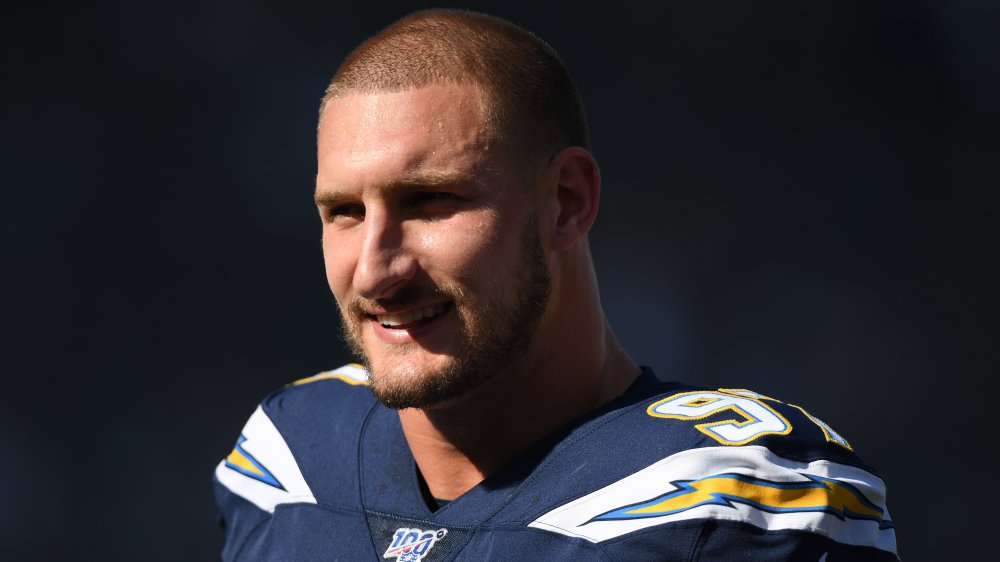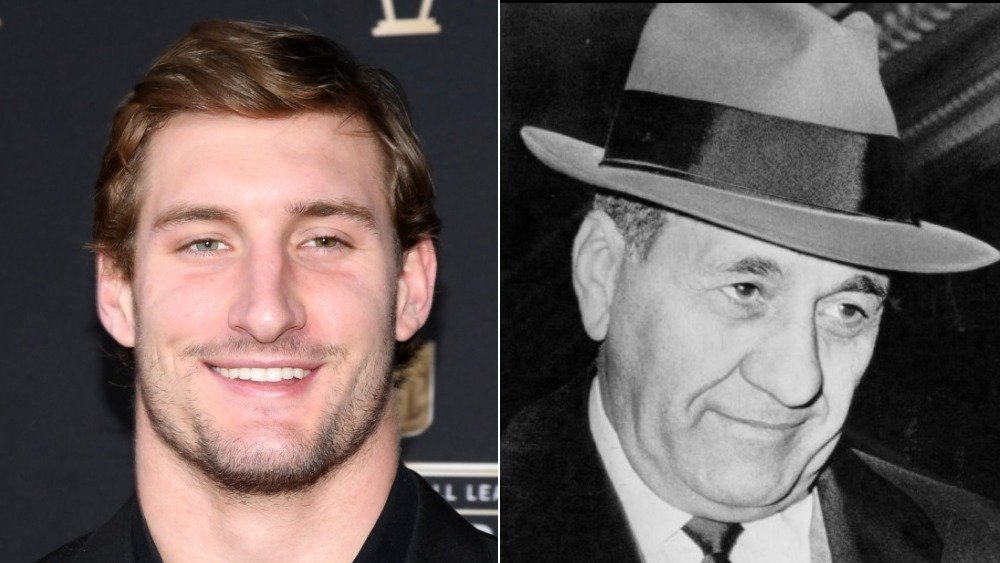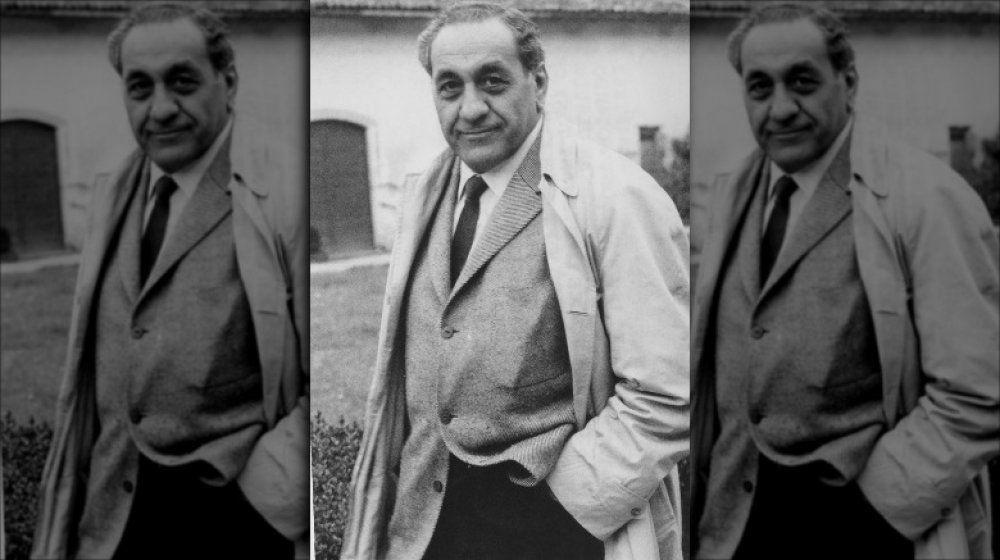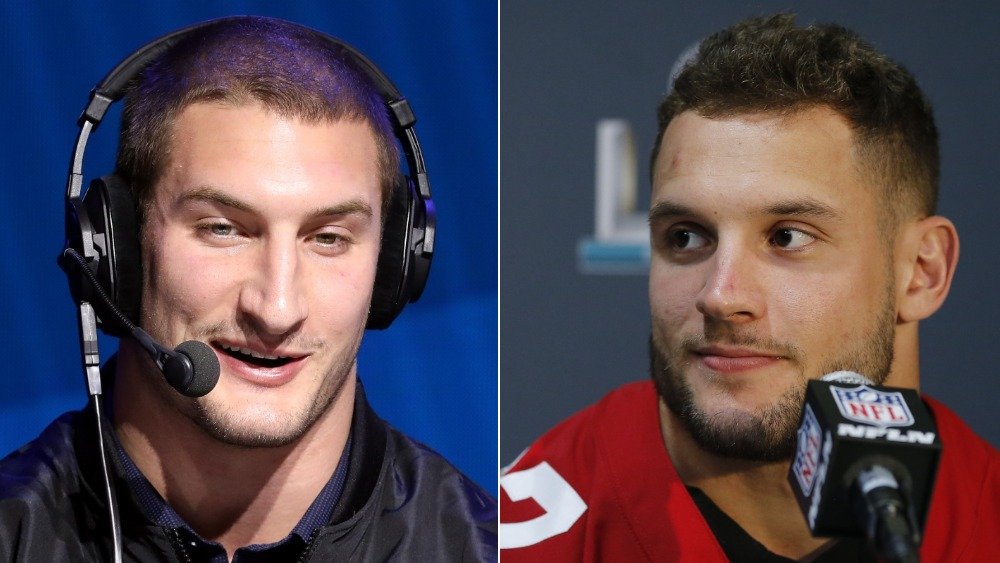The Truth About Joey Bosa's Mob Boss Great-Grandfather
Although football player Joey Bosa might still be in the early stages of his professional career, the defensive end has already enjoyed his fair share of success. During Bosa's college football days as a defensive player for Ohio State University, he earned the Big Ten Defensive Player of the Year title his sophomore year, as well as a spot as an All-American. He was then drafted by the San Diego Chargers — now the Los Angeles Chargers — as the third overall pick in 2016 and has continued his seemingly unstoppable upward trajectory within the NFL's defensive ranks ever since. But when you stop to consider his family's ongoing football legacy — his father John and uncle Eric Kumerow both played professionally during the 1980s — it's no wonder Bosa has been able to carve out his own path to stardom.
However, despite Bosa's impressive list of credentials, there's one outstanding fact about his family's history that's often forgotten: Bosa's late great-grandfather was a prominent member of Chicago's underground crime syndicate, otherwise known as the American Mafia. Bosa himself has been reluctant to go on the record about his relationship with his forebearer Tony Accardo's less-than-legal profession. In a 2016 interview with TMZ, his brother Nick stated it "was not something [he] should really be talking about," let alone Joey. But, thanks to Accardo's own activities during his lifetime, we were able to dig up the story behind the crime boss and uncover the truth ourselves.
Joey Bosa's great-grandfather, Tony Accardo, was a longtime mobster
Joey Bosa's great-grandfather Tony Accardo, who also went by the nicknames "Joe Batters" and "Big Tuna," was in for the long haul when it came to his position in the mob. During his decades-long tenure, Accardo mainly operated out of Chicago as part of the Chicago Outfit, the city's crime syndicate, which was once overseen by the infamous mafioso Al Capone.
According to his 1992 obituary in The Los Angeles Times, Accardo was born Antonio Leonardo Accardo and raised in Chicago's Little Italy neighborhood, the son of a shoemaker. He grew up under the wing of Capone himself and was first employed as his chauffeur and bodyguard. Quickly rising through the ranks, Accardo later bragged about his crime-related coming-of-age in the Capone era, purportedly boasting about being a key triggerman for the 1929 St. Valentine's Day Massacre, in which seven members of the Outfit's rival North Side gang were assassinated by four of Capone's men disguised as police officers. (Although FBI agent William Roemer believed Accardo's claims, others believed his involvement was, if anything, ancillary at best.)
Regardless of whether Accardo had anything to do with the massacre directly, it didn't deter his criminal career. After Capone was convicted and incarcerated for tax evasion in 1931, Accardo was promoted within the Outfit and put in charge of gambling operations. From there, the only way to go was up.
Joey Bosa's great-grandfather denied he was a mob boss
After Joey Bosa's great-grandfather was appointed to the role of underboss of Chicago's crime syndicate in 1943 by Capone's de facto successor Paul Ricca, Tony Accardo remained a loyal subject until Ricca's retirement in 1968, per Accardo's 1992 obituary in The Los Angeles Times. After that, the man know as "Joe Batters" (nicknamed after his propensity for using a baseball bat) and "Big Tuna" (dubbed "by a Chicago newspaper reporter after having his picture taken with a 400-pound tuna he caught off Florida") ruled over the Chicago Outfit until his death from a heart condition.
Although Accardo liked to brag that he never served time in prison, he was always in the FBI's crosshairs during his tenure. Like his mentor Al Capone, the underboss was charged with tax evasion in 1960 and sentenced to six years in prison, but the verdict was ultimately overturned. The Los Angeles Times also noted that Accardo "was a three-time target of the U.S. Senate's permanent subcommittee on investigations," but repeatedly "invoked the Fifth Amendment guarantee against self-incrimination" whenever he was on the stand, thus avoiding jail time. The last time he testified in 1984, Accardo went as far as to deny his place as the boss of the Chicago Outfit entirely, stating under oath that he "[had] no control over anybody," let alone serving as the premiere shot-caller for one of the most extensive syndicates in true crime history.
Joey Bosa isn't Tony Accardo's only descendant to play football
Strangely enough, Joey Bosa isn't the only one of Tony Accardo's descendants who went on to have an illustrious NFL career. As mentioned previously, Joey's father John Bosa played for the Miami Dolphins as a defensive end for three seasons before officially retiring in 1989. Around the same time, Joey's uncle Eric Kumerow also played defense for the Dolphins, overlapping with John before his own retirement in 1990.
But Joey's NFL legacy doesn't stop there: Kumerow's father, Palmer Pyle, played professionally from 1960 to 1966 with teams including the Baltimore Colts, the Minnesota Vikings, and the Oakland Raiders. Pyle served as the direct link to late mob boss Accardo's family through his marriage to Marie Accardo, Tony's daughter, although their relationship eventually ended in divorce.
Even crazier? Joey isn't the only NFL player of his generation: Joey's brother Nick Bosa has played for the San Francisco 49ers since 2019. And, although both Nick and Joey are remiss to talk about their connections to their great-grandfather, they have still managed to end up in hot water over family ties. In 2018, former NFL coach Rex Ryan accused both brothers of habitually milking football-related injuries, simultaneously implying through a jab at their father, John, that they were able to do so because of their bonafide NFL-based family dynasty (via the New York Post). Ouch!




